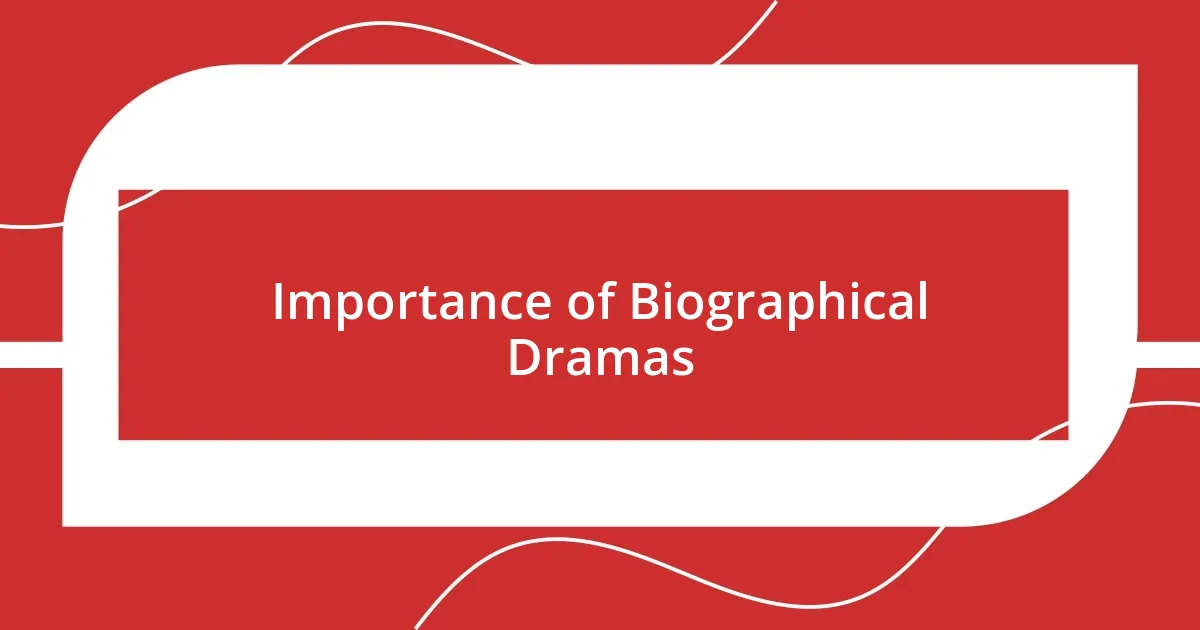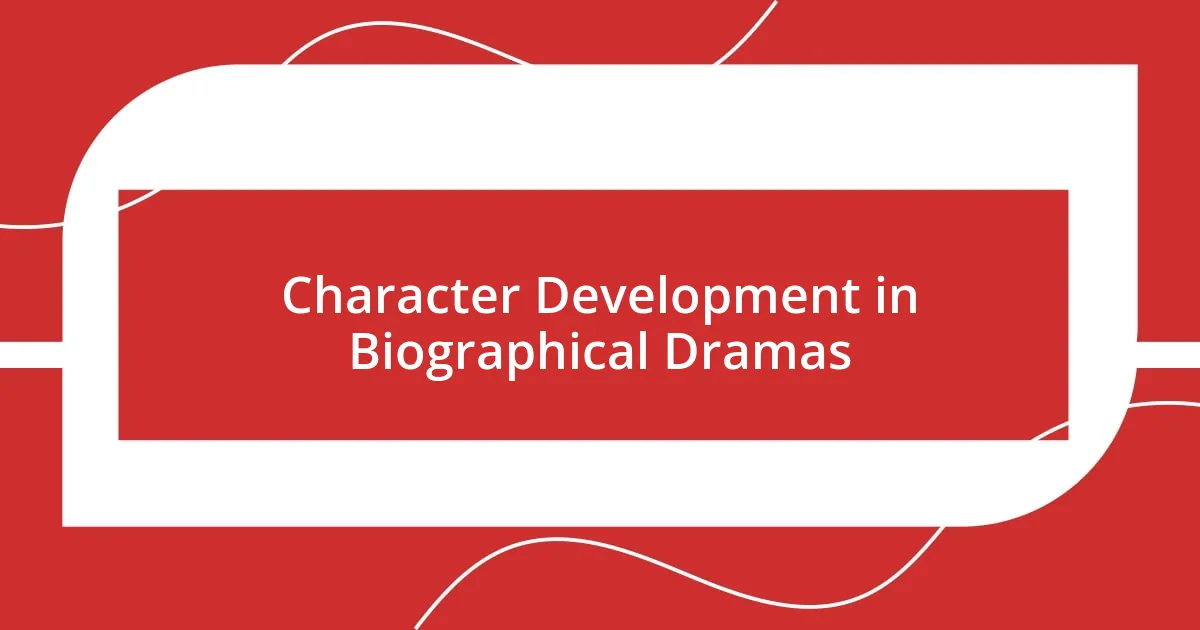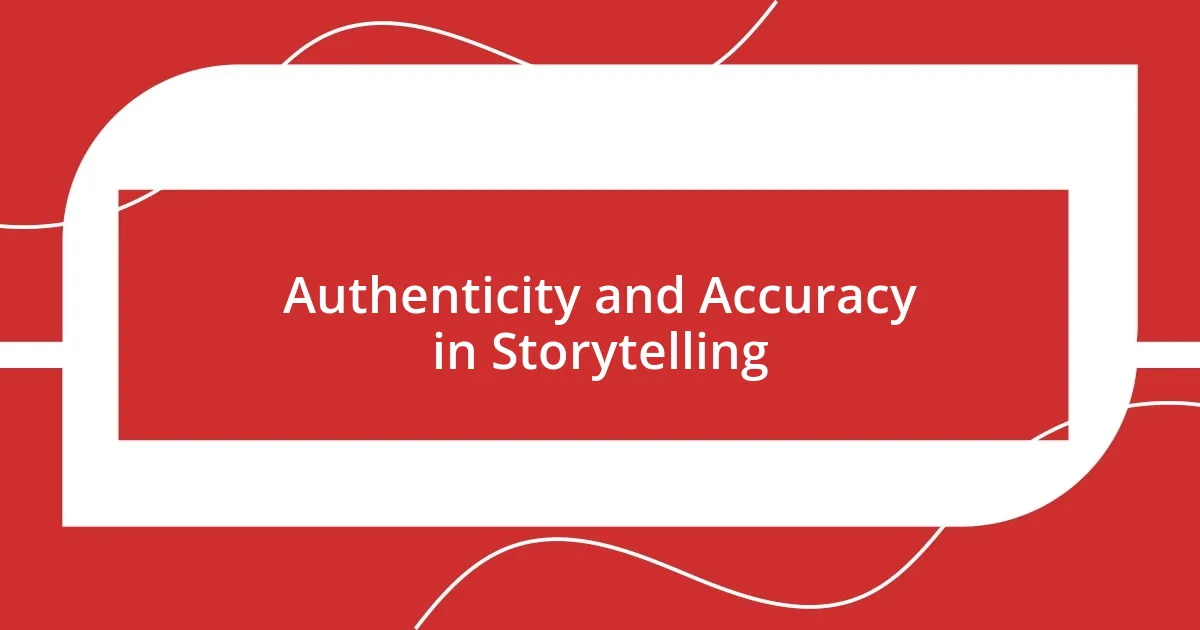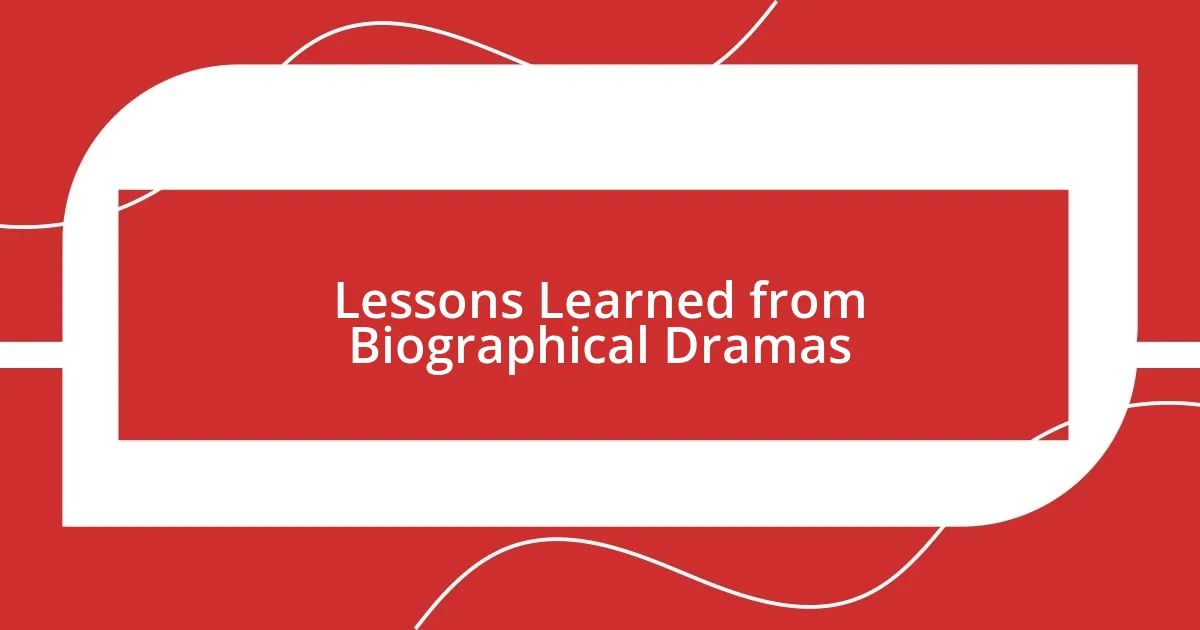Key takeaways:
- Biographical dramas allow personal connections to historical figures, inspiring reflection on resilience and societal issues.
- Character development in these films highlights the evolution of individuals through challenges, relationships, and legacy building.
- Authenticity and accuracy in storytelling enhance emotional impact and help viewers relate history to their own lives.
- Learning life lessons from biographical dramas motivates viewers to reflect on their roles in advocating for change and embracing their own challenges.

Importance of Biographical Dramas
Biographical dramas hold immense importance because they allow us to step into the shoes of remarkable individuals, making history feel personal and relatable. I remember watching a film about a celebrated scientist, and I found myself connecting with his struggles and triumphs in a way that textbooks never captured. Have you ever felt that spark of inspiration from witnessing someone’s journey brought to life on screen?
These films also serve as a mirror, reflecting our societal values and issues. They inspire conversations around topics that matter, like resilience, sacrifice, and identity. I often find myself chatting with friends after watching these dramas, pondering how those historical figures faced challenges that still resonate today. Isn’t it fascinating how experiences from decades ago can echo our present circumstances?
Moreover, biographical dramas can ignite a passion for learning about the past. After watching one that depicted an artist’s life, I suddenly had an urge to dive into art history, exploring the context behind their masterpieces. Isn’t it incredible how a single film can spark curiosity and compel us to uncover the stories behind the people who shaped our world?

Character Development in Biographical Dramas
Biographical dramas excel at showcasing character development, allowing us to witness the evolution of extraordinary individuals. I recall the emotional journey in a film about a famous civil rights leader. Each stage of their life reflected not only personal growth but also the societal changes they influenced. It’s compelling to see how a character’s beliefs may waver under pressure, yet inevitably, they emerge stronger.
- These films often highlight key aspects of character transformation:
- Challenges and Obstacles: The protagonist faces significant hurdles that test their resolve.
- Critical Relationships: Interactions with family, friends, or mentors serve as catalysts for growth.
- Moments of Reflection: Introspection allows characters to reassess their values and decisions.
- Crisis Points: Key events force characters to confront their fears and evolve.
- Legacy Building: They often shift from personal goals to broader societal impacts, illustrating a true metamorphosis.
I find that immersing myself in these character arcs is more than just entertainment. It’s an exploration of resilience, often echoing my personal experiences where I felt just as lost and then emerged renewed. I’ve learned that these stories remind me of the power of determination and the importance of having a vision.

Authenticity and Accuracy in Storytelling
Authenticity and accuracy in storytelling are paramount in biographical dramas for several reasons. When a film captures the essence of a person’s life, it not only honors their legacy but also educates viewers about pivotal historical moments. I remember watching a biopic about a groundbreaking journalist; the attention to detail in how they portrayed her groundbreaking investigations made me feel as if I were right there, witnessing her struggles and triumphs firsthand. Has a film ever made you feel connected to a person’s story in such an impactful way?
However, the balance between artistic license and factual representation can be tricky. While some creative liberties can enhance the narrative, they risk distorting the subject’s true character or events. For instance, I watched a dramatization of a renowned composer’s life, and while I loved the music and emotions portrayed, I found myself questioning the accuracy of some relationships depicted. This led me to research more about his life to bridge the gap between the film’s portrayal and reality. Don’t you think it’s important to confirm the authenticity of those dramatic portrayals?
Ultimately, viewers crave stories that resonate with truth. The emotional impact of seeing a true story unfold on screen can leave a lasting impression, inspiring us to learn more about the subjects. As I learned about the real events behind a famous inventor’s journey, I found motivation in the challenges he faced, realizing that history often reflects our own struggles. Isn’t it rewarding to connect the dots between fiction and reality, leading to a greater understanding of ourselves through the lens of others’ lives?
| Aspect | Importance |
|---|---|
| Emotional Impact | Authentic portrayals evoke genuine emotions. |
| Historical Education | Accuracy deepens our understanding of significant events. |
| Relatability | Real stories connect us to our own experiences. |

Emotional Impact and Audience Engagement
Experiencing emotional impact in biographical dramas goes beyond the narratives; it’s about connecting deeply with the characters’ journeys. I vividly remember watching a film about a renowned scientist where his struggles with self-doubt mirrored my own battles in academia. Seeing his breakthroughs after moments of despair made me feel a surge of motivation, prompting me to reflect on my own resilience. Isn’t it fascinating how stories from another’s life can evoke emotions that resonate with our personal experiences?
Audience engagement is fundamentally tied to these emotional elements. When we see characters navigate through hardship, it’s easy to empathize, allowing us to invest in their stories. I recall being captivated by a biopic that highlighted a brilliant dancer who overcame physical limitations. The scenes where she faced rejection and then triumphed were powerful; they seemed to echo moments in my life when I had to rise above challenges. Have you ever found yourself rooting for a character because their struggle felt so relatable and real?
The emotional weight these stories carry often leads us to reevaluate our own lives. For instance, after watching a film about a revolutionary leader, I found myself contemplating my role in advocating for change. The depiction of their unwavering commitment fueled a sense of responsibility within me to contribute to my community, illustrating how biographical dramas stimulate not just reflection, but action. It makes me wonder: how often do these films inspire us to make meaningful changes in our own lives?

Lessons Learned from Biographical Dramas
Biographical dramas offer profound life lessons that resonate long after the credits roll. One film that struck me was about a legendary civil rights leader. The portrayal of their relentless fight for justice pushed me to reflect on my own responsibilities in advocating for important causes. I couldn’t help but ask myself: what am I doing to contribute to positive change in my community?
In another instance, I watched a biopic focused on a famous artist overcoming tremendous obstacles. The scenes showcasing their deep-seated fears really hit home for me; they reminded me of my own struggles with self-doubt when pursuing my passions. It’s amazing how such portrayals allow us to see parts of ourselves in the journeys of others. Have you ever found that a character’s struggle mirrored a challenge in your own life, prompting you to face it head-on?
Delving into these narratives teaches us to appreciate resilience and determination. After seeing a film about a celebrated inventor who’s faced countless failures, I felt inspired to embrace my own setbacks as learning opportunities rather than roadblocks. It leads me to wonder, aren’t our own challenges often the stepping stones to discovery? Through the lens of biographical dramas, we learn not just about the past, but about how to shape our own futures with courage and tenacity.

Recommended Biographical Dramas to Watch
When it comes to recommended biographical dramas, I can’t recommend “The Theory of Everything” enough. This film about the life of Stephen Hawking captivated me with its raw portrayal of love and struggle. Hawking’s journey through ALS and his incredible accomplishments in physics made me reflect on the importance of perseverance. How often do we allow our circumstances to limit us? Watching his story reminded me that our potential is only as restricted as we let it be.
Another gem that left a mark on my heart is “Hidden Figures.” This film shines a light on the incredible contributions of three African American women at NASA during the Space Race. Their fight against racial and gender barriers resonated with me deeply, sparking memories of my own battles in an industry that often overlooks diverse voices. Watching them rise to prominence was a powerful reminder of the impact one can have when they refuse to be invisible. Have you ever felt that your voice didn’t matter, only to find inspiration in someone else’s journey?
Lastly, “A Beautiful Mind” intricately blends personal struggles with exceptional intellect through the life of John Nash. I was utterly absorbed by his grappling with schizophrenia and how that complex experience shaped his groundbreaking work in mathematics. It made me ponder how societal perceptions can skew our understanding of mental health and genius. Why do we often overlook the struggles behind success? Nash’s story is an eye-opening conversation starter that encourages us to be more compassionate and informed about mental health issues.













